| Weight | 1 lbs |
|---|---|
| Dimensions | 9 × 5 × 2 in |
| accession | P10145 |
| express system | E.coli |
| product tag | biotin at C-terminal |
| purity | > 97% by SDS PAGE |
| molecular weight | Predicted Molecular Mass: 10,803.49 Da Extinction Coefficient: 12,900 M-1 cm-1 Actual Molecular Mass: 10,803 Da by ESI Mass Spec |
| available size | 10 µg, 100 µg, 2 µg, 50 µg |
| endotoxin | <0.01 EU per 1μg of the protein by the LAL method |
Biotinylated Interleukin 8 (IL-8 /CXCL8) 8024
Price range: $134.00 through $2,862.00
Summary
- Expression: E.coli
- Amino Acid Range: 28-99
Biotinylated Interleukin 8 (IL-8 /CXCL8) 8024
| protein |
|---|
| Database link: human P10145 |
| Size and concentration 2, 10, 50, 100µg and lyophilized |
| Form Lyophilized |
| Storage Instructions Avoid repeated freeze-thaw cycles: • 12 months from date of receipt, -20 to -70 °C as supplied. • 1 month, 2 to 8 °C under sterile conditions after reconstitution. • 3 months, -20 to -70 °C under sterile conditions after reconstitution |
| Storage buffer ​Reconstitution: Spin sample prior to reconstitution. Recommended concentration of 100µg/mL in sterile water. Shipping: Room Temp |
| Purity > 97% by SDS PAGE and HPLC |
| target relevance |
|---|
| Interleukin 8 (IL-8 )(CXCL8) is secreted primarily by macrophages and monocytes. It is one of the key mediators for inflammatory responses. IL-8 is a strong chemotractant for neutrophils and monoccytes, and promotes activation of these target cells by binding to two cell surface receptors CXCR1 and CXCR2. It is also a strong angiogenic agent, and is considered to play a role in the pathogenesis of bronchiolitis. Biotinylated CXCL8 is made using the enzymatic method, which has several advantages over chemical biotinylation methods. The attachment of biotin at a specific lysine residue is nearly 100% complete, and leads to a modified chemokine with functionalities comparable to those of the unmodified CXCL8 in migration assay. Utilizing avidin/streptavidin analogues conjugated to various fluorescent labels, biotinylated CXCL8 is useful in studies on receptor identification, distribution, chemokine binding, and other cellular assays. They serve as great tools in visualization and quantification, and can replace radioactively labeled chemokines. |
| Protein names Interleukin-8 (IL-8) (C-X-C motif chemokine 8) (Chemokine (C-X-C motif) ligand 8) (Emoctakin) (Granulocyte chemotactic protein 1) (GCP-1) (Monocyte-derived neutrophil chemotactic factor) (MDNCF) (Monocyte-derived neutrophil-activating peptide) (MONAP) (Neutrophil-activating protein 1) (NAP-1) (Protein 3-10C) (T-cell chemotactic factor) [Cleaved into: MDNCF-a (GCP/IL-8 protein IV) (IL8/NAP1 form I); Interleukin-8 ((Ala-IL-8)77) (GCP/IL-8 protein II) (IL-8(1-77)) (IL8/NAP1 form II) (MDNCF-b); IL-8(5-77); IL-8(6-77) ((Ser-IL-8)72) (GCP/IL-8 protein I) (IL8/NAP1 form III) (Lymphocyte-derived neutrophil-activating factor) (LYNAP) (MDNCF-c) (Neutrophil-activating factor) (NAF); IL-8(7-77) (GCP/IL-8 protein V) (IL8/NAP1 form IV); IL-8(8-77) (GCP/IL-8 protein VI) (IL8/NAP1 form V); IL-8(9-77) (GCP/IL-8 protein III) (IL8/NAP1 form VI)] |
| Gene names CXCL8,CXCL8 IL8 |
| Protein family Intercrine alpha (chemokine CxC) family |
| Mass 11098Da |
| Function FUNCTION: Chemotactic factor that mediates inflammatory response by attracting neutrophils, basophils, and T-cells to clear pathogens and protect the host from infection (PubMed:18692776, PubMed:7636208). Also plays an important role in neutrophil activation (PubMed:2145175, PubMed:9623510). Released in response to an inflammatory stimulus, exerts its effect by binding to the G-protein-coupled receptors CXCR1 and CXCR2, primarily found in neutrophils, monocytes and endothelial cells (PubMed:1840701, PubMed:1891716). G-protein heterotrimer (alpha, beta, gamma subunits) constitutively binds to CXCR1/CXCR2 receptor and activation by IL8 leads to beta and gamma subunits release from Galpha (GNAI2 in neutrophils) and activation of several downstream signaling pathways including PI3K and MAPK pathways (PubMed:11971003, PubMed:8662698). {ECO:0000269|PubMed:11971003, ECO:0000269|PubMed:11978786, ECO:0000269|PubMed:1840701, ECO:0000269|PubMed:18692776, ECO:0000269|PubMed:1891716, ECO:0000269|PubMed:2145175, ECO:0000269|PubMed:2212672, ECO:0000269|PubMed:7636208, ECO:0000269|PubMed:8662698, ECO:0000269|PubMed:9623510}. |
| Subellular location SUBCELLULAR LOCATION: Secreted. |
| Structure SUBUNIT: Homodimer (PubMed:31235521). Dimer formation is disrupted by tick evasin-3 (PubMed:31235521). Interacts with TNFAIP6 (via Link domain); this interaction interferes with chemokine binding to glycosaminoglycans. {ECO:0000269|PubMed:24501198, ECO:0000269|PubMed:31235521}. |
| Post-translational modification PTM: Several N-terminal processed forms are produced by proteolytic cleavage after secretion from at least peripheral blood monocytes, leukcocytes and endothelial cells. In general, IL-8(1-77) is referred to as interleukin-8. IL-8(6-77) is the most promiment form. {ECO:0000269|PubMed:11023497, ECO:0000269|PubMed:11978786, ECO:0000269|PubMed:2145175, ECO:0000269|PubMed:2212672, ECO:0000269|PubMed:2523801, ECO:0000269|PubMed:2648135}.; PTM: Citrullination at Arg-27 prevents proteolysis, and dampens tissue inflammation, it also enhances leukocytosis, possibly through impaired chemokine clearance from the blood circulation. {ECO:0000269|PubMed:18710930, ECO:0000269|PubMed:19608678}.; PTM: (Microbial infection) Cleaved by group A Streptococcus protease SpyCEP; leading to impaired neutrophil endothelial transmigration and thus increased virulence. {ECO:0000269|PubMed:18692776}. |
| Target Relevance information above includes information from UniProt accession: P10145 |
| The UniProt Consortium |
Data
Publications
| pmid | title | authors | citation |
|---|---|---|---|
| We haven't added any publications to our database yet. | |||
Protocols
| relevant to this product |
|---|
| Migration assay |
Documents
| # | ||
|---|---|---|
| Please enter your product and batch number here. | ||
Only logged in customers who have purchased this product may leave a review.
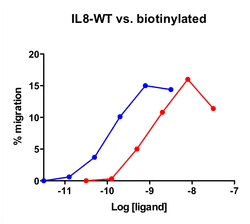
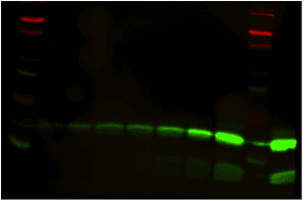
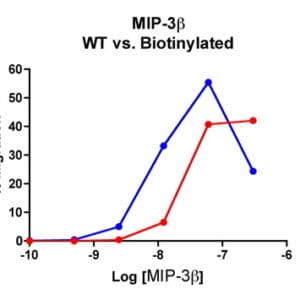
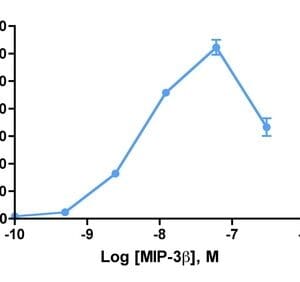
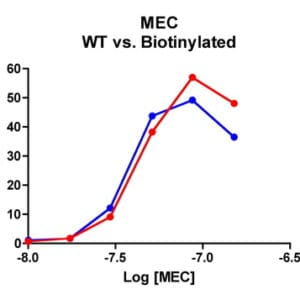

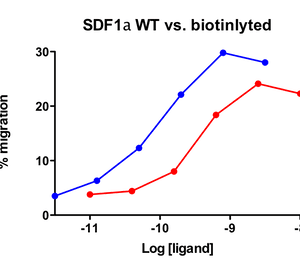
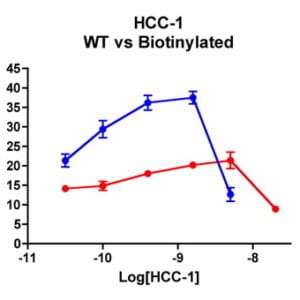
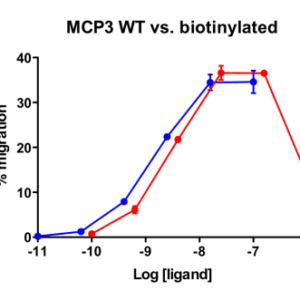
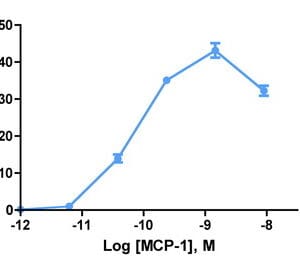
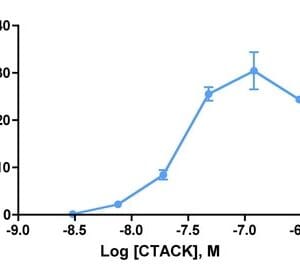
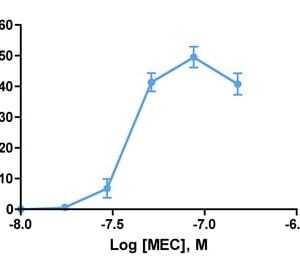
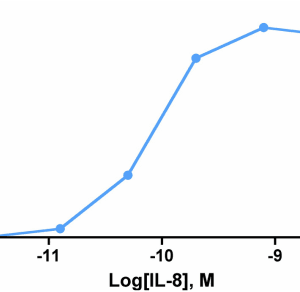
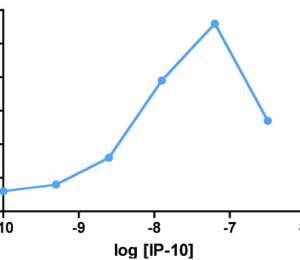
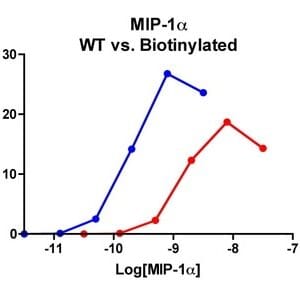
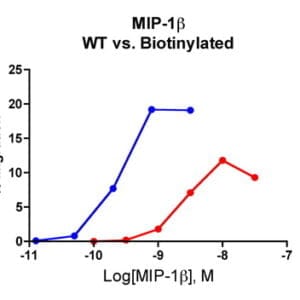

Reviews
There are no reviews yet.